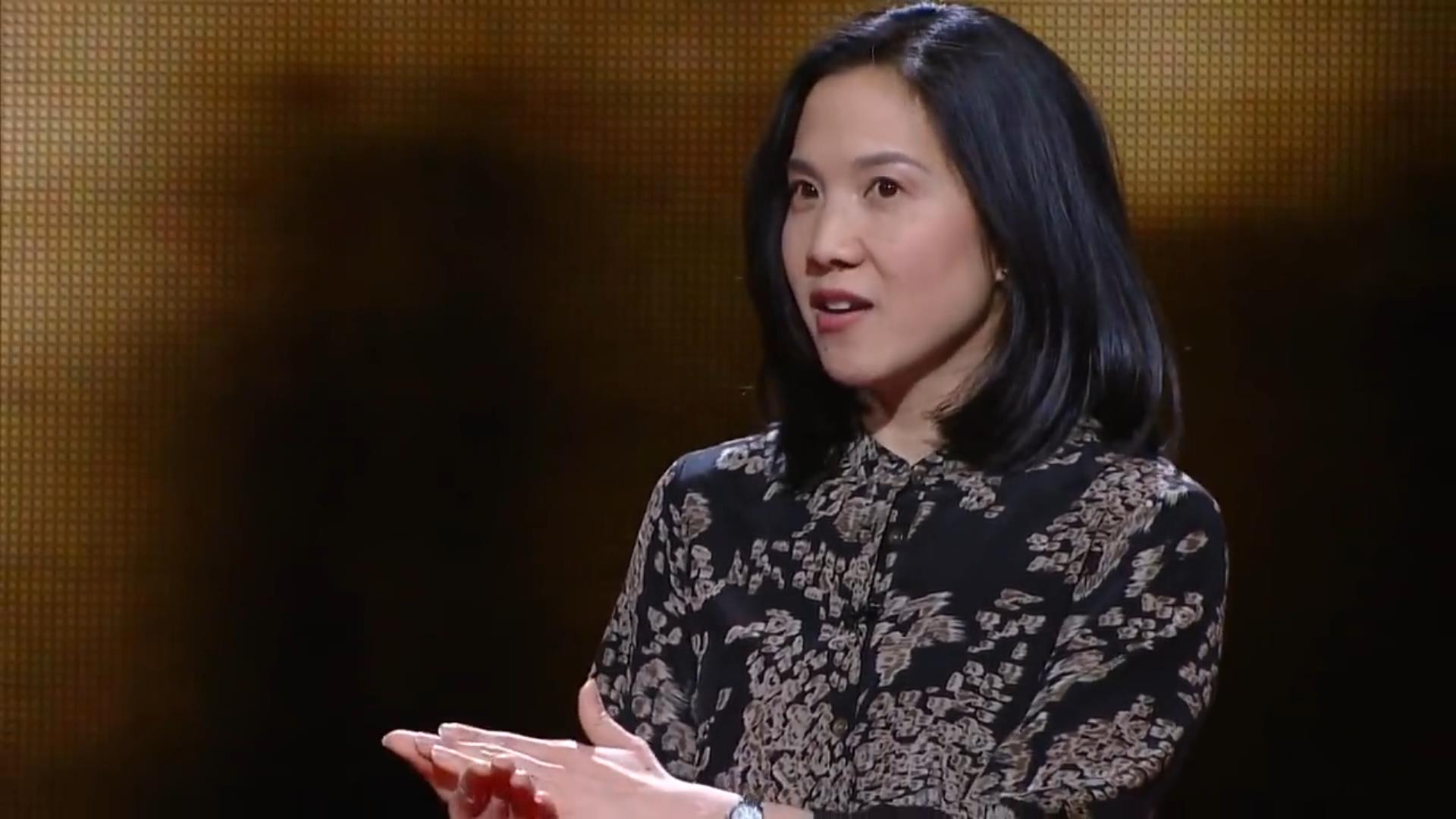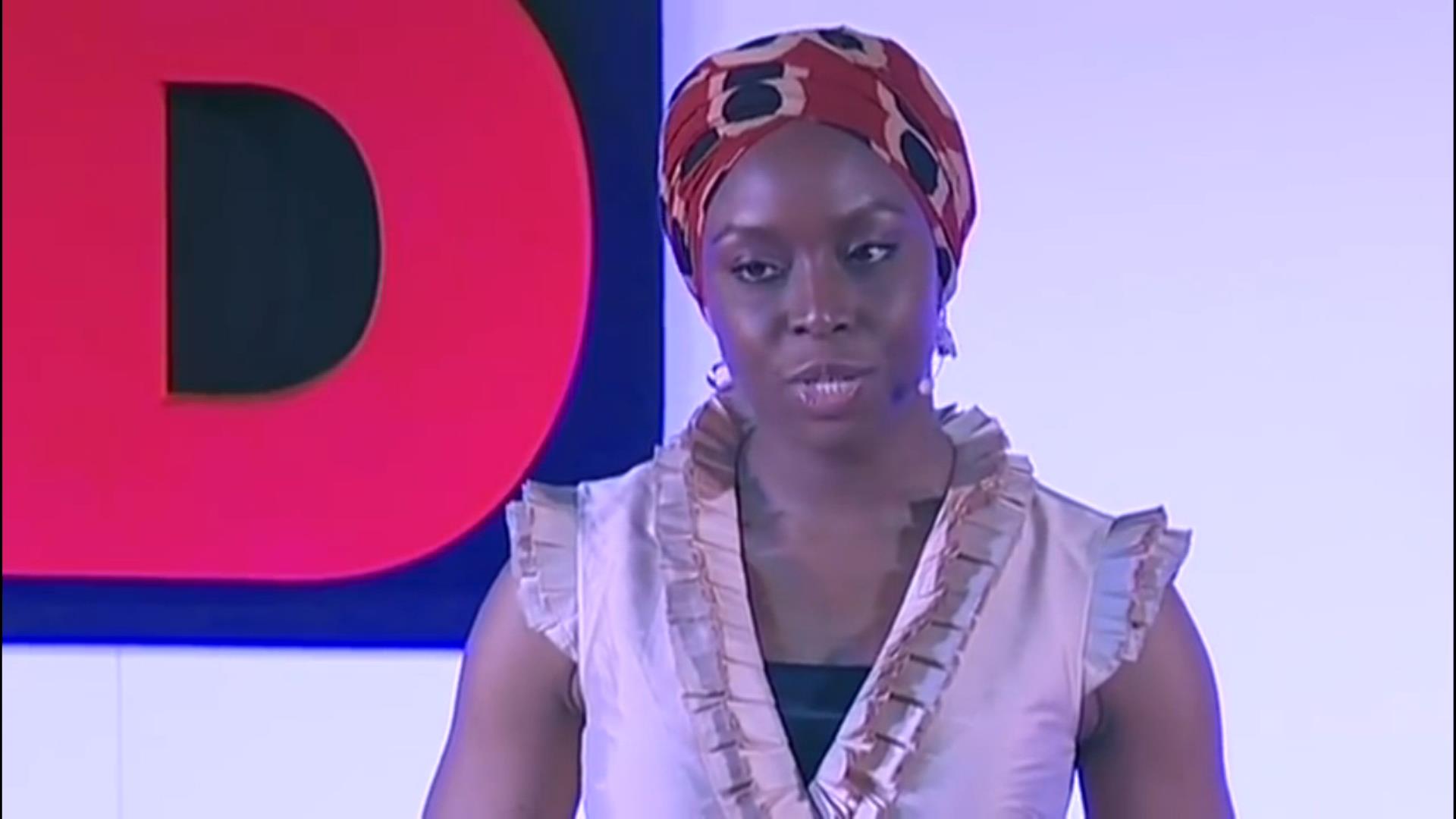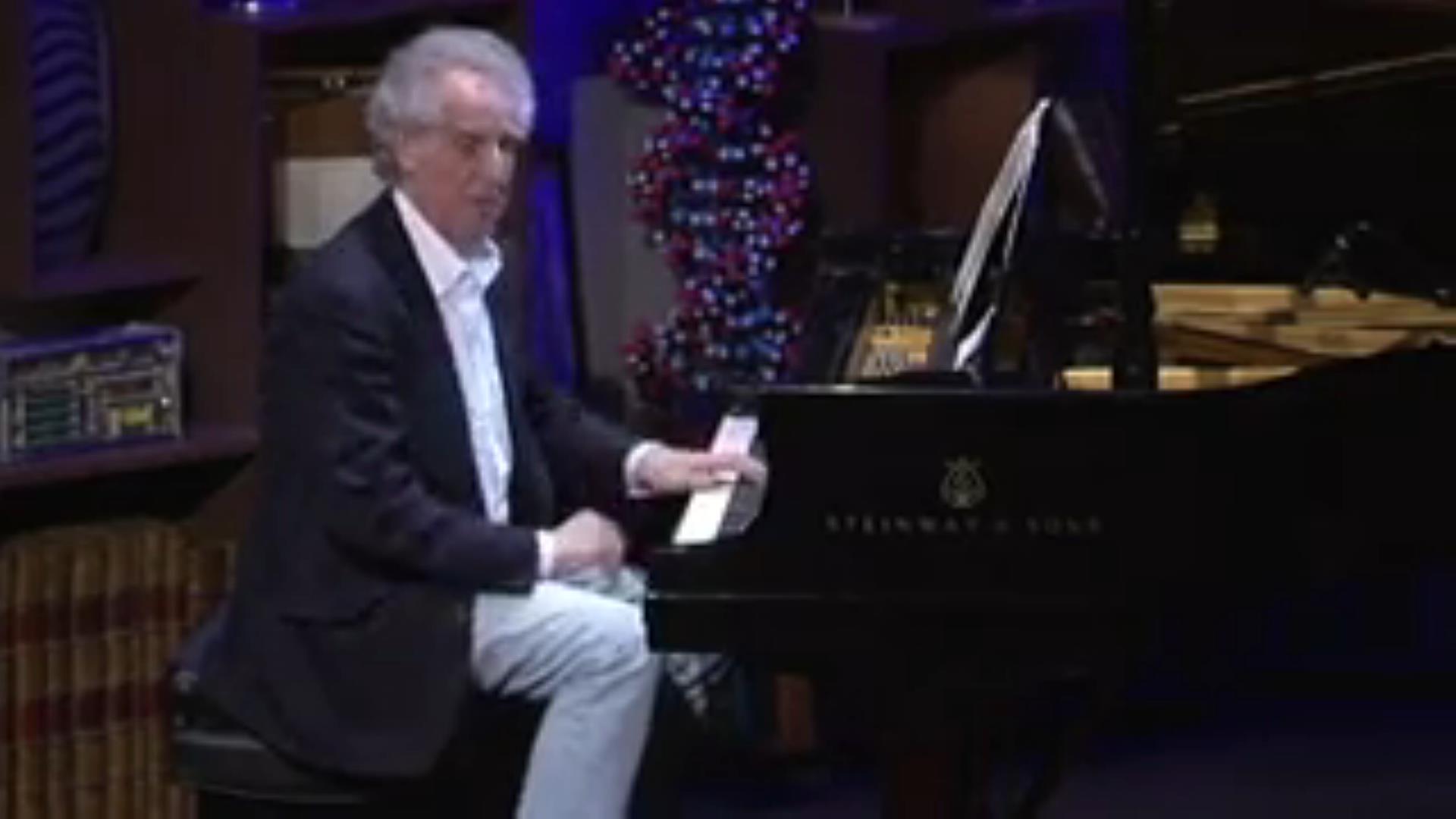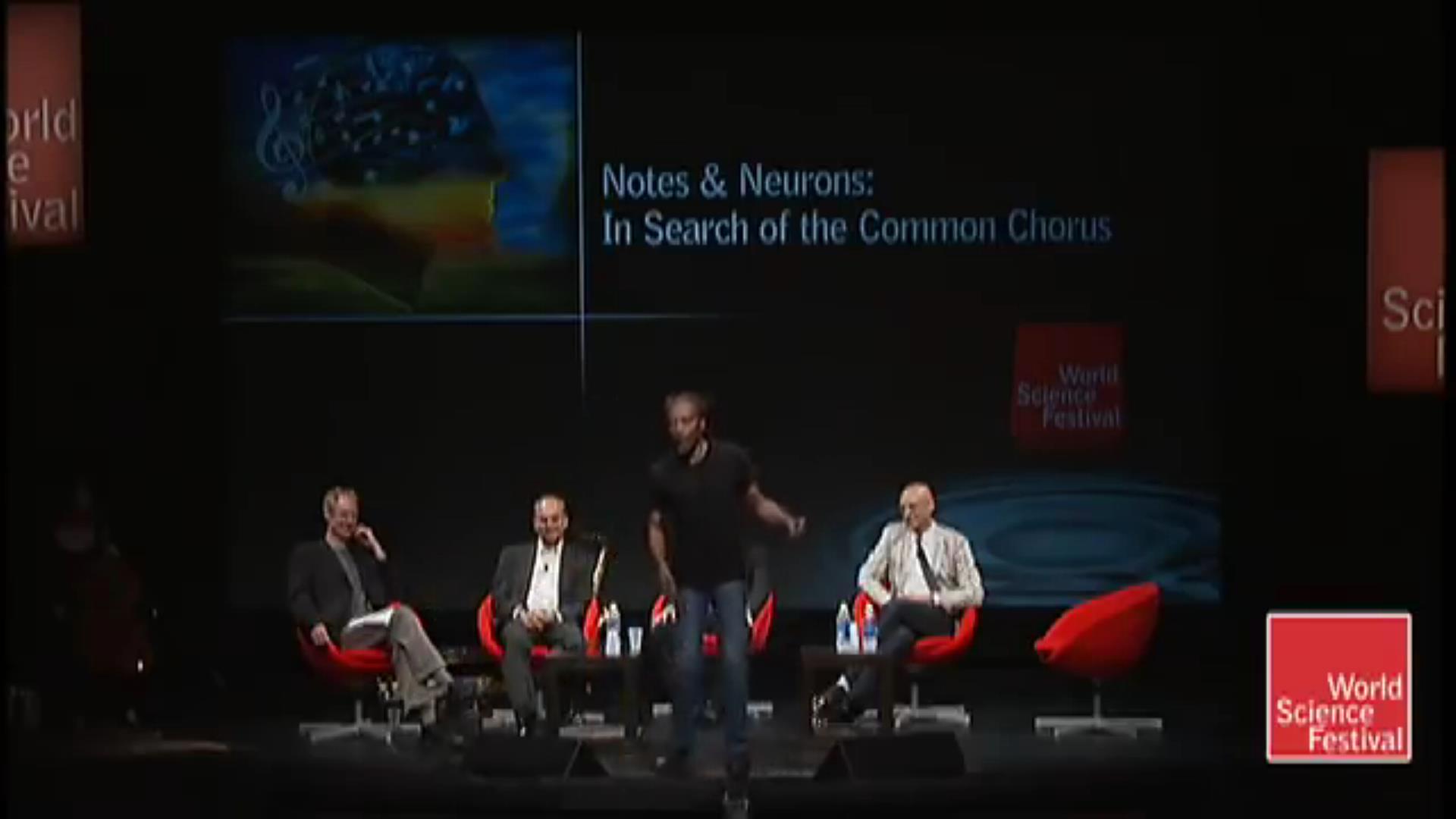
|
 |
|
2. Example of Directed Eye gaze and pivot alone as effective tools to engage with the audience. In this clip Chimamanda Ngozi Adichie does not use arm gestures. But she doesn't have to. She consciously directs and redirects her gaze and the direction of her head and facial expressions sweeping across the audience to bring every member into her story. The only possible detractor is that she is reading notes, thus when she looks down to read, she can loose the attention of some listeners or viewers. |
 |
|
Audience Participation: 2 examples
1. Both of these clips are excellent examples of how a speaker can directly engage with an audience successfully. How? What's the key piece? Set an expectation, and guide the audience to fulfill it! |
 |
|
|
 |
|
|
| My Stroke of Insight |
| Jill Bolte Taylor got a research opportunity few brain scientists would wish for: She had a massive stroke, and watched as her brain functions -- motion, speech, self-awareness -- shut down one by one. An astonishing story. |
| How to Measure Your Life |
| It’s actually really important that you succeed at what you’re succeeding at, but that isn’t going to be the measure of your life. |
| The Skill of Self Confidence |
| As the Athletic Director and head coach of the Varsity Soccer team at Ryerson University, Dr. Joseph is often asked what skills he is searching for as a recruiter: is it speed? Strength? Agility? In Dr. Joseph"s TEDx Talk, he explores self confidence and how it is not just the most important skill in athletics, but in our lives. |
|
Grit: The Power of Passion and Perseverance |
| Leaving a high-flying job in consulting, Angela Lee Duckworth took a job teaching math to seventh graders in a New York public school. She quickly realized that IQ wasn"t the only thing separating the successful students from those who struggled. Here, she explains her theory of "grit" as a predictor of success. |
|
Why Some of Us Don’t Have One True Calling |
| Writer and artist Emilie Wapnick discusses how she dedicated herself to vnumerous interests and then would move on, which caused her a lot of anxiety because she wasn’t sure how she would turn any of these interests into a career. She calls these people "multipotentialites," and believe they have as much future in the workforce as people who specialize for their entire career. |
|
The Power of Vulnerability |
| Brene Brown is a research professor at the University of Houston Graduate College of Social Work and author who has spent 16 years studying: vulnerability, connection, courage, empathy and shame. Her talk focuses on the relationship between these states of being. It is one of the most popular TED Talks. |
|
The Art of Asking |
| Don’t make people pay for music, says Amanda Palmer. Let them. In a passionate talk that begins in her days as a street performer (drop a dollar in the hat for the Eight-Foot Bride!), she examines the new relationship between artist and fan. |
|
What Makes a Good Life |
| What keeps us happy and healthy as we go through life? If you think it’s fame and money, you’re not alone – but, according to psychiatrist Robert Waldinger, you’re mistaken. As the director of 75-year-old study on adult development, Waldinger has unprecedented access to data on true happiness and satisfaction. In this talk, he shares three important lessons learned from the study as well as some practical, old-as-the-hills wisdom on how to build a fulfilling, long life. |
|
Who Am I? Think Again |
| How do we decide who we are? Hetain Patel"s surprising performance plays with identity, language and accent -- and challenges you to think deeper than surface appearances. A delightful meditation on self, with performer Yuyu Rau, and inspired by Bruce Lee. |
|
What Makes a Great Speech |
| There's no single formula for a great talk, but there is a secret ingredient that all the best ones have in common. TED Curator Chris Anderson shares this secret – along with four ways to make it work for you. Do you have what it takes to share an idea worth spreading? |
|
Do Schools Kill Creativity? |
| Sir Ken Robinson makes an entertaining and profoundly moving case for creating an education system that nurtures (rather than undermines) creativity. |
|
The Transitive Power of Classical Music |
| Benjamin Zander has two infectious passions: classical music, and helping us all realize our untapped love for it -- and by extension, our untapped love for all new possibilities, new experiences, new connections. |
| A rhythm-etic. The Math Behind the Beat |
|
Do Schools Kill Creativity |
| Sir Ken Robinson makes an entertaining and profoundly moving case for creating an education system that nurtures (rather than undermines) creativity. |
|
How Great Leaders Inspire Action |
| Simon Sinek has a simple but powerful model for inspirational leadership -- starting with a golden circle and the question: "Why?" His examples include Apple, Martin Luther King Jr. and the Wright brothers ... |
|
The Power of Vulnerability |
| Brene Brown studies human connection -- our ability to empathize, belong, love. In a poignant, funny talk, she shares a deep insight from her research, one that sent her on a personal quest to know herself as well as to understand humanity. A talk to share. |
|
Why We Do What We Do |
| Tony Robbins discusses the "invisible forces" that motivate everyone"s actions -- and high-fives Al Gore in the front row. |
|
The Surprising Science of Happiness |
| Dan Gilbert, author of "Stumbling on Happiness," challenges the idea that we"ll be miserable if we don’t get what we want. Our "psychological immune system" lets us feel truly happy even when things don’t go as planned. |
|
The Art of Misdirection |
| Hailed as the greatest pickpocket in the world, Apollo Robbins studies the quirks of human behavior as he steals your watch. In a hilarious demonstration, Robbins samples the buffet of the TEDGlobal 2013 audience, showing how the flaws in our perception make it possible to swipe a wallet and leave it on its owner’s shoulder while they remain clueless. |
|
Brain Magic |
| First, Keith Barry shows us how our brains can fool our bodies -- in a trick that works via podcast too. Then he involves the audience in some jaw-dropping (and even a bit dangerous) feats of brain magic. |
|
Extreme Swimming with the World´s Most Dangerous Jellyfish - Diana Nyad |
| From Cuba to Florida. In this funny, powerful talk at TEDMED, she talks about how to prepare mentally to achieve an extreme dream, and asks: What will YOU do with your wild, precious life? |
|
Reject the Single Story |
| Our lives, our cultures, are composed of many overlapping stories. Novelist Chimamanda Adichie tells the story of how she found her authentic cultural voice -- and warns that if we hear only a single story about another person or country, we risk a critical misunderstanding. |
|
What Makes a Great Speech |
| There’s no single formula for a great talk, but there is a secret ingredient that all the best ones have in common. TED Curator Chris Anderson shares this secret – along with four ways to make it work for you. Do you have what it takes to share an idea worth spreading? |
|
Your Body Language May Shape Who You Are |
| Body language affects how others see us, but it may also change how we see ourselves. Social psychologist Amy Cuddy argues that "power posing" – standing in a posture of confidence, even when we don’t feel confident – can boost feelings of confidence, and might have an impact on our chances for success. NOTE: Some of the findings presented in this talk have been referenced in an ongoing debate among social scientists about robustness and reproducibility. Read "Criticisms & updates" below for more details as well as Amy Cuddy’s response. |
|
The Skill of Self Confidence |
| As the Athletic Director and head coach of the Varsity Soccer team at Ryerson University, Dr. Joseph is often asked what skills he is searching for as a recruiter: is it speed? Strength? Agility? In Dr. Joseph’s TEDx Talk, he explores self confidence and how it is not just the most important skill in athletics, but in our lives. |
|
Grit: The Power of Passion and Perseverance |
| Leaving a high-flying job in consulting, Angela Lee Duckworth took a job teaching math to seventh graders in a New York public school. She quickly realized that IQ wasn’t the only thing separating the successful students from those who struggled. Here, she explains her theory of "grit" as a predictor of success. |
|
Why Some Of Us Don’t Have One True Calling |
| Writer and artist Emilie Wapnick discusses how she dedicated herself to numerous interests and then would move on, which caused her a lot of anxiety because she wasn"t sure how she would turn any of these interests into a career. She calls these people "multipotentialites," and believe they have as much future in the workforce as people who specialize for their entire career. |
|
Life Is Your Talents Discovered |
| Sir Ken Robinson makes an entertaining and profoundly moving case for creating an education system that nurtures (rather than undermines) creativity. |
|
World Champion 2000 Toastmasters |
| Ed Tate, CSP – Certified Speaking Professional, World Champion of Public Speaking on the main stage of the 2009 Million Dollar Roundtable (MDRT). Topic: 5 Tips to Supercharge Your Business Presentations! |
|
How Great Leaders Inspire Action |
| Simon Sinek has a simple but powerful model for inspirational leadership -- starting with a golden circle and the question: "Why?" His examples include Apple, Martin Luther King Jr. and the Wright brothers ... |
|
Why We Do What We Do |
|
Tony Robbins discusses the "invisible forces" that motivate everyone’s actions -- and high-fives Al Gore in the front row.
|
  |